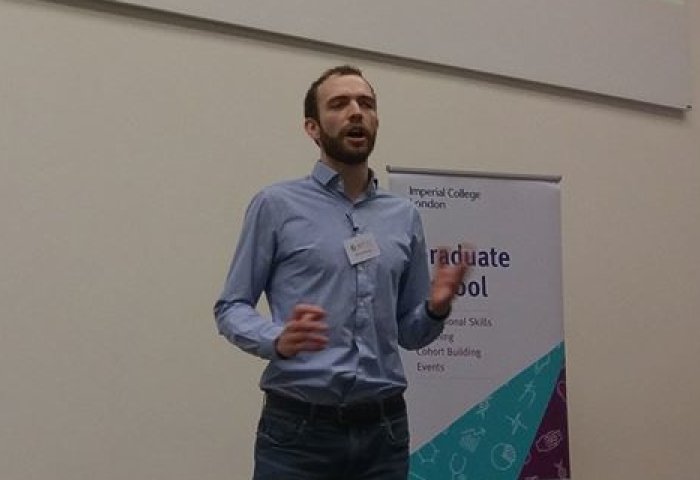EE PhD Student wins people's choice communication award
by Emma Rainbow

Matt Douthwaite won the People’s Choice Award at the Imperial College Graduate School’s recent Three Minute Thesis Competition.
Matt is a PhD student in the Centre for Bio-Inspired Technology, Circuits and Systems Group, supervised by Dr Pantelis Georgiou. He presented his research at the Competition on 'wearable integrated circuits for sweat analysis.’
The Competition challenges PhD students to present their research and its significance in only three minutes, and in a way that a diverse audience will understand. The Competition is an ideal way for research students to develop their academic, presentation, and research communication skills.
Matt did his undergraduate degree with us in Electrical and Electronic Engineering, graduating in 2015, and we are thrilled that he has won this prize! Communication skills are a vital part of our undergraduate degree programme in order to help develop our graduates into professional engineers.
See below for an extract about Matt’s research which he presented at the Competition.
My research focuses on tackling the challenges faced with designing a fully integrated wearable chemical sensor, for analysis of sweat on the body. While most wearables on the market today focus on physical signs, such as heartrate or number of steps, there is now an opportunity to gain more insightful information on human physiology in the same non-invasive manner, thanks to developments in micro- and flexible electronics.
The research focuses on analysing sweat, a bio-fluid that is rich in ions, small molecules, small proteins and peptides. Information can be obtained from measuring the concentration of some of these components, for example sodium and chloride is an indicator of sweat rate and hydration and potassium (the concentration of which correlates to that in blood) is widely used for diagnosis of cystic fibrosis. Furthermore, glucose present in interstitial fluid also manifests in sweat presenting an opportunity to non-invasively monitor levels in diabetics.
Many research groups are investigating the use of electrochemical techniques to analyse bio-fluids on the body, but most use ion-selective electrodes. This work focusing on integrated sensors called ion-sensitive field effect transistors, a technology proven in DNA sequencing systems. These chemically sensitive transistors can be manufactured in a standard CMOS technology, allowing the possibility of a fully integrated solution and creating a lab-on-chip on the body.
Click for more information about this year’s competition and the other competitors.
Undergraduate degrees in Electrical and Electronic Engineering
PhDs in Electrical and Electronic Engineering
Centre for Bio-Inspired Technology, Circuits and Systems Group
Article text (excluding photos or graphics) © Imperial College London.
Photos and graphics subject to third party copyright used with permission or © Imperial College London.
Reporter
Emma Rainbow
Department of Electrical and Electronic Engineering